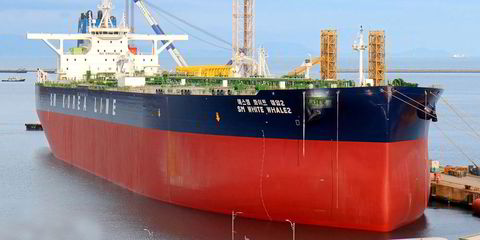You would not want to have responsibility for the port of Long Beach, California, with the US and China ever closer to a trade war.
The terminals there win two-thirds of their container import traffic from the Far East nation and one-third of exports. This is now in danger.
The port of Los Angeles also handles vast amounts of US agricultural exports such as soyabeans heading for China.
Up the coast, Californian almonds, rice and Napa Valley wine are shipped through Oakland on their way to the world’s most populous market.
West coast US ports handled more than $3bn-worth of pork on its way to China, while facilities on the country's east coast worked on a further $1bn.
But this business carried by transpacific liner operators is now pitched into a state of uncertainty. No one usually wins this kind of standoff and it is not just ports and shipowners in the firing line.
“A trade war with China is a bad thing for pretty much all transports,” Wolf Research said in a recent note.
Bimco, the largest international shipping organisation, has already declared that “all trade-restrictive measures are in principle bad for shipping”.
Last weekend, China and the US failed to resolve their differences during a visit to Beijing by shipowner and now US commerce secretary Wilbur Ross.
Beijing warned after the meetings that there could be no trade deals as long as the US went ahead with threatened tariff increases on Chinese imports.
Washington upped the ante last week by renewing a threat to impose 25% charges on $50bn of Chinese technology exports.
Ross also said tariffs of 25% on steel and 10% on aluminium with the European Union, Canada and Mexico had been introduced too.
These moves come despite signs of compromise from China last month that it was willing to find ways of reducing its trade surplus with the US.
Donald Trump has made clear his determination to reduce a US-China trade imbalance, which reached a record level of $375bn last year.
In theory, this is part of his America First strategy to put domestic interests above all other and rebuild the US economy.

In fact, Wall Street and the US workforce are doing fine. Equities have been trading at record levels and figures released last Friday show official unemployment rates are at their lowest level for 18 years at 3.8% (it should be noted that this downward trend started way before Trump arrived in the White House).
It is also not really clear whether hiking tariffs on Chinese goods will create any new jobs in the US or just bring imports from elsewhere.
Chinese manufacturers themselves could switch their production to other countries and export from there.
Equally, a slump in low-cost Chinese imports will likely lead to US industry — and consumers — being forced to pay more for goods.
That could backfire either with lower business activity in the US or even a loss of local jobs.
And, of course, even talk of a US-China trade war creates its own dynamic as Jan Rindbo, the chief executive of bulker operator Norden, stated last month.
“Increased uncertainty means people may buy a little bit less so, rather than buying two cargoes, you take one and wait and see,” Rindbo said. “That has had already some impact on dry cargo demand.”
And it is not just traditional rivals such as China that are in the sights of the pugnacious US president but formally close allies such as the EU and Canada.
Canadian Prime Minister Justin Trudeau described the US tariff move as “totally unacceptable” and said he would be imposing his own penalties of up to $15bn on $13bn-worth of US exports such as American steel, whisky and coffee.

The EU has threatened to put barriers up against Harley Davidson and other iconic US products.
These nationalist moves are probably against World Trade Organization rules and certainly make international governance ever more difficult.
This can make it harder to deal with global issues such as climate change and even potentially undermine the likes of the IMO.
It is also self-defeating. In the words of top US economist Jeffrey Sachs: “Trump is rapidly destroying American global leadership, alliances and interests.”
Specific victims, in my view, could be local shipowners and their crews, US railroad staff and the 14,000 full or part-time dock workers of Los Angeles and Long Beach.




